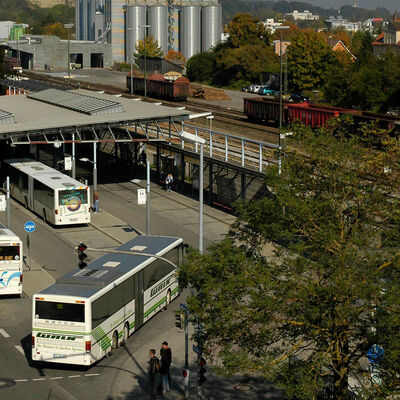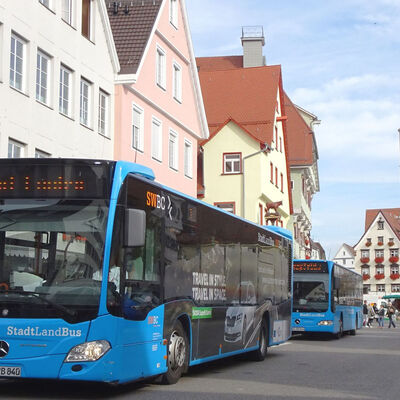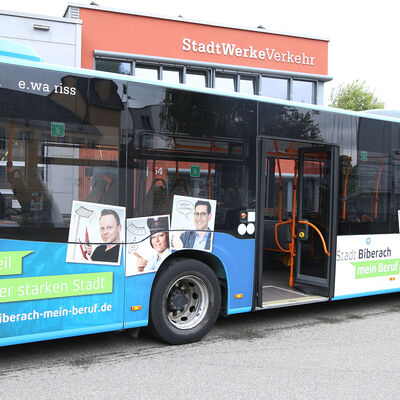Mobility
In Biberach an der Riß, you are always mobile. Thanks to the wide range of public transport options ─ be it by bus, train or car ─ you can get to your destination quickly.
This section includes everything you need to know about mobility in Biberach. For more information, you can also visit the Biberach traffic department website and the Biberach public utility company
Driving licence
Do you have a valid driving licence in your home country but now want to drive in Germany? Here you can read what you need to bear in mind in terms of driving licenses.
Issuance of a domestic driving licence for EU citizens
If you have a valid driving licence from an EU state (including Iceland, Norway and Liechtenstein), you do not need to do anything else. You can simply drive a car in Germany for an unlimited period of time using your existing driving licence.
Issuance of a domestic driving licence to citizens from a non-EU country
Driving licences from a non-EU country initially retain their validity in Germany for a specific period of time. If you wish to continue driving after this period lapses, you will need to have your foreign driving licence exchanged for a German driving licence.
Note: If you are not yet of age in Germany, your existing driving licence is not legally valid! You therefore also cannot use it on a temporary basis.
To exchange your foreign driving licence for a German one, you must pass the theoretical as well as a practical driving test. However, you do not need to take the customary driving lessons in Germany and can simply sign up directly to take the exams. This can be done at any driving school in Germany.
Nationals of certain countries are not required to take the theoretical and practical exams, however, if the exam conditions in their home country correspond to German requirements. Other nationals, on the other hand, are only required to take one of the two exams.
Vehicle registration
If you want to drive a car in Germany, you first must register it at the vehicle registration office, known in Germany as the “Kfz-Zulassungsstelle”. This, of course, does not apply if you are only on holiday in Germany.
Registering your vehicle from the EU
Vehicles from other European countries typically have a valid CoC certificate. CoC stands for “Certificate of Conformity”. This document states that your vehicle is in compliance with EU standards. The CoC certificate does not always have to have the words “Certificate of Conformity” on it as a translation in the respective national language typically appears instead.
If your vehicle has a CoC certificate, you can register it in Germany. If you do not have a CoC certificate for your vehicle because it was built before the mid-1990s, for example, you first need to have it tested and inspected by an officially recognised expert. To this end, please read the section entitled, “Registering your own vehicle (non-EU countries)”.
To register your vehicle at the vehicle registration office, or Kfz-Zulassungsstelle, you must present the following documents:
- Your valid ID card or passport
- Confirmation of third-party insurance for the vehicle. You are not legally permitted to drive the vehicle without this insurance!
- Registration certificate (EU country)
- CoC certificate
- Confirmation that the vehicle is roadworthy (“Nachweis über Hauptuntersuchung” / proof of main inspection), or more often simply called «TÜV»
- Contract of sale. Your name must appear on this contract.
- SEPA mandate so that motor vehicle tax can be debited (= motor vehicle tax) once annually
- “Declaration for VAT purposes” for new automobiles
- Foreign licence plates of the vehicle if it is still registered abroad
Registering your vehicle from a non-EU country
Vehicles brought into Germany from a non-EU country must first be tested and inspected by an officially recognised expert. To this end, it will normally suffice if you contact a German automotive workshop. They will then organise everything for you there.
If the technical expert determines that your car is not in compliance with EU standards, you will have to have it modified or repaired accordingly. In rare cases ─ for example, with American-made vehicles ─ a fee-based exemption may also be granted.
To register your vehicle in Germany from a non-EU country, you will need the following documents:
- Your valid ID card or passport
- Confirmation of third-party insurance for the vehicle. You are not legally permitted to drive the vehicle without this insurance!
- Registration certificate from the non-EU country
- CoC certificate
- Confirmation that the vehicle is roadworthy (“Nachweis über Hauptuntersuchung” (proof of main inspection) or more often simply called «TÜV»). Not applicable if you have just received the CoC certificate as the driving ability test forms part of the CoC examination
- Contract of sale. Your name must appear on this contract.
- Permission for motor vehicle tax (Kfz-Steuer) to be debited once annually (can be completed on site)
- Verification that the customs office was informed regarding the import of your vehicle and was in agreement with this (= “Unbedenklichkeitsbescheinigung” (clearance certificate))
- Foreign licence plates of the vehicle if it is still registered abroad
Registering a used vehicle purchased in Germany
To register a used vehicle purchased in Germany, you will need the following:
- Your valid ID card or passport
- Confirmation of third-party insurance for the vehicle. You are not legally permitted to drive the vehicle without this insurance!
- Registration certificate parts 1 and 2 (handed to you by the seller)
- Confirmation that the vehicle is roadworthy (“Nachweis über Hauptuntersuchung” (proof of main inspection) or more often simply called «TÜV») will also be handed over to you by the seller
Registering a new vehicle purchased in Germany
If you purchase a new vehicle in Germany, you will need to present the following documents for registration:
- Your valid ID card or passport
- Confirmation of third-party insurance for the vehicle. You are not legally permitted to drive the vehicle without this insurance!
- Registration certificate part 2 (part 1 is issued on site during registration)
- Confirmation that the vehicle is roadworthy (“Nachweis über Hauptuntersuchung” (proof of main inspection) or more often simply called «TÜV») will be handed over to you by the seller
- The CoC certificate. CoC stands for “Certificate of Conformity”. This document states that your new vehicle is approved within the EU as it meets the standards that apply here. The term “EG-Übereinstimmungsbescheinigung” (EC certificate of conformity) is also often found on the CoC certificate in German. This is obtained from the seller.
Resident parking permit
In the inner city of Biberach, you are only allowed to park your car if you have a valid resident parking permit. This pass allows the city to ensure that people who live in very busy parts of the city can always find a parking space close to their home.
Please ask your landlord if a resident parking permit is required in your street, or look for the street signs posted.
Emissions sticker
Motor vehicles in Germany break down into different categories, depending on the quantity of pollutants emitted. The respective category is indicated by a sticker printed in the designated colour ─ the emissions sticker. Vehicles that emit a great deal of pollutants are assigned a red sticker, whereas vehicles that are one better have a yellow sticker. Vehicles that emit a minimum level of pollution are assigned the green emissions sticker.
In many German cities, so-called environmental zones have been erected, whereby only vehicles with a green sticker are allowed to drive here. This is currently not the case in Biberach. If your vehicle has a yellow or red sticker, you are required to park outside the low emissions zone and use public transport.
The objective of these low emissions zones is to ensure good air quality in inner city environments. You can acquire the emissions sticker for your vehicle at the TÜV, the vehicle registration office (Kfz-Zulassungsstelle) as well as at certain automotive workshops. It only costs a few Euro and adheres to the inside of your windscreen.
Overview of public transport
If you want to get around Biberach without driving a car, you can use the city's well-developed bus network, or ÖPNV. During the day, buses run at least every 30 minutes and even more frequently, depending on the district. All bus lines congregate at the market plaza and train station. Here, you can easily switch from one bus to the next. At night and on weekends, the dial-a-ride transit programme (Anrufsammeltaxi, or AST) will take you safely from A to B.
To go from Biberach to the neighbouring cities of Ulm, Ravensburg or Friedrichshafen, it is best to take the train. Go to the following websites to check the current connections to your destination:
https://www.ding.eu/de/fahrplan/fahrplanauskunft/
https://www.swbc.de/03_Verkehr/Fahrplaene.php
https://www.efa-bw.de/
Car Sharing in Biberach
In Biberach, you can also drive a car via a car sharing programme if you need to do some major shopping or want to transport a piece of furniture, for example. The “teilAuto Biberach” association offers its members access to different cars on an hourly, daily or even weekly basis:
https://www.teilauto-biberach.de



